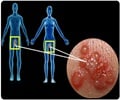A component of herpes virus which allows it to rapidly and successfully invade the nervous system by ‘hijacking’ the machinery inside human cells has been identified.

This is the first time researchers have shown a viral protein directly engaging and subverting the cellular motor; most other viruses passively hitch a ride into the nervous system.
"This protein not only grabs the wheel, it steps on the gas," says Smith. "Overtaking the cellular motor to invade the nervous system is a complicated accomplishment that most viruses are incapable of achieving. Yet the herpesvirus uses one protein, no others required, to transport its genetic information over long distances without stopping."
Herpesvirus is widespread in humans and affects more than 90 percent of adults in the United States. It is associated with several types of recurring diseases, including cold sores, genital herpes, chicken pox, and shingles. The virus can live dormant in humans for a lifetime, and most infected people do not know they are disease carriers. The virus can occasionally turn deadly, resulting in encephalitis in some.
Until now, scientists knew that herpesviruses travel quickly to reach neurons located deep inside the body, but the mechanism by which they advance remained a mystery.
Smith's team conducted a variety of experiments with VP1/2 to demonstrate its important role in transporting the virus, including artificial activation and genetic mutation of the protein. The team studied the herpesvirus in animals, and also in human and animal cells in culture under high-resolution microscopy. In one experiment, scientists mutated the virus with a slower form of the protein dyed red, and raced it against a healthy virus dyed green. They observed that the healthy virus outran the mutated version down nerves to the neuron body to insert DNA and establish infection.
Advertisement
Additionally, Smith says, "By learning how the virus infects our nervous system, we can mimic this process to treat unrelated neurologic diseases. Even now, laboratories are working on how to use herpesviruses to deliver genes into the nervous system and kill cancer cells."
Advertisement
"Some of our mutants will advance brain mapping studies by resolving these connections more clearly than was previously possible," he says.
Source-Eurekalert















